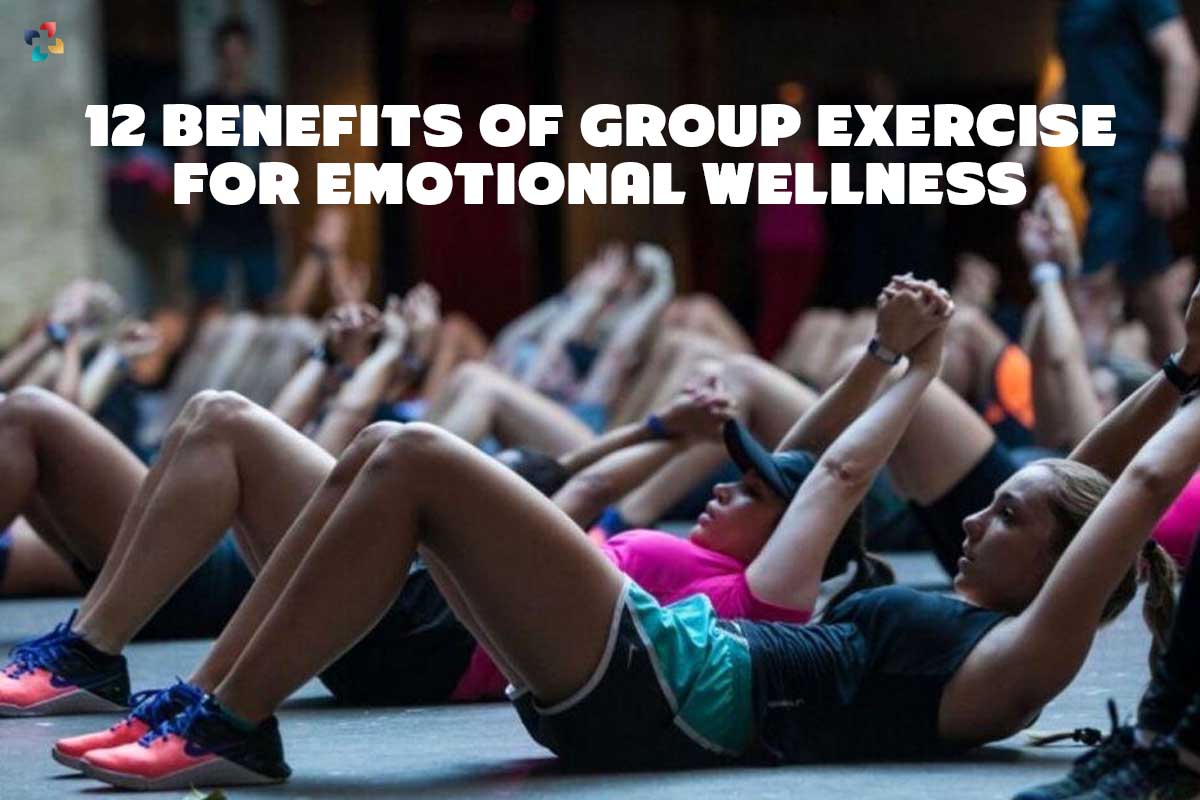As a health and fitness practitioner, you know that group fitness sessions may not only help people reach well-known advantages like maintaining healthy body weight or growing lean muscle mass, but they can also be a potent stimulant for improving mental well-being. After all, exercise raises levels of neurotransmitters such as dopamine and cannabinoids, which aid in increasing emotions of pleasure while decreasing feelings of physical pain.
Exercising in a group environment also provides an increasingly essential social component that promotes community and connection. Whether it’s encouraging words from an instructor or just getting caught up in the music and energy of other participants, here are 10 ways that group Exercise for Emotional Wellness.
Here are 12 Benefits of Group Exercise for Emotional Wellness;
1. Music has an instantaneous and pleasant effect on emotions and sentiments.
Lauren George, an ACE Certified Personal Trainer from Mississippi and co-creator of the Barre Above group Exercise for Emotional Wellness program, understands how music may help create a good emotional experience. “When it comes to creating emotion, music is quite strong!” It may take us back in time, remind us of a loved one, improve our mood, boost our resolve, and help us form bonds through shared experiences. “I’ve found that although my participants may not recall the workouts we performed, they will remember wonderful music,” she adds.
2. Strenuous exercise may aid in the production of hormones and neurotransmitters that are necessary for healthy emotional wellness.

Dr. Steve Durant, a Boston-based sports psychologist, and exercise enthusiast who works out with former rugby teammates on a weekly basis feel that group fitness is vital in modifying body chemistry. “On Saturdays, I look forward to a boot-camp training that I perform with many other elderly rugby players. “We may appear and move like the Walking Dead, but it’s a massive oxytocin surge and dopamine rush that also boosts testosterone,” Durant adds, “all of which helps us feel like our younger selves while we work our [tails] off.”
3. A group exercise class develops into an important social group.
Megan Rodham, a pediatric nurse in Northern Virginia, didn’t understand how much she valued group workouts’ emotional component until she stopped coming. “I’d done group exercises for years until my spouse became ill, and then I quit,” she says. “I miss the friendship, stretching, and teamwork. I now recognize how significant that was in my life. It was more than just a workout; it was a team effort. It was personal.”
4. The group experience is advantageous to both students and teachers.
Purnima Aiyar, a Bangalore, India-based group Exercise for Emotional Wellness teacher, has reaped advantages as both a participant and an instructor. “As someone who has been on both sides, as an instructor and a participant, some of the emotional advantages I’ve encountered on my fitness path include feeling noticed, respected, and less alone.” “The excitement from a group of individuals all working towards the same objective [in a class] can be infectious,” she adds.
5. Strenuous exercises boost self-esteem.
A difficult group Exercise for Emotional Wellness is not only excellent for your body, but it may also give you the courage to face other challenges in life. “Exercise has a significant mental power component,” says Kelly Moore, ACE Certified Group Fitness Instructor and CEO of Fit Tech University. “Once participants see themselves getting stronger and more capable of completing difficult exercises, they may apply that experience to other life situations.”
6. Physical activity gives a respite from screen time.
Cori Parks, an ACE Certified Group Training Instructor and Personal Trainer in Vienna, Va., believes that group fitness provides both a physical and mental vacation from our screens and electronics. “A group Exercise for Emotional Wellness provides a much-needed respite from technology and screen time; many participants have expressed a desire to unplug from technology while engaging with people in real life.”
7. Exercise may help with other parts of life.
Life may be stressful, and looking for reliable service providers such as contractors, babysitters, or mechanics can only add to the stress. David Mesirow is a Palm Springs-based ACE Certified Group Fitness Instructor who has been teaching group Exercise for Emotional Wellness for over 40 years. He has seen that after group exercise members become friends, they exchange professional service provider suggestions, which is terrific stress relief.

“I’ve seen group members suggest professions like hairdressers, real estate brokers, or babysitters; finding the perfect service provider who performs a fantastic job may help make life a bit simpler,” he added. Furthermore, he feels that group exercises are particularly beneficial to the emotional well-being of his older participants. “For many older folks, going to the gym to join a class is their sole opportunity to socialize and chat with their contemporaries.”
8. Group fitness fosters a strong sense of community.
Amy Connell, an ACE Certified Group Exercise Instructor located in Houston, Texas, enjoys the social aspect of group fitness. “The communal component of group training is a huge advantage that might be difficult to measure,” says Connell, author of Your Worthy Body: Find Freedom in Health by Breaking Every Rule.
“I’ve watched individuals going into class not feeling their best emotionally, [but] after the Exercise for Emotional Wellness is over, they’re smiling and conversing with friends, and it is plain to tell they have totally transformed their perspective. Even if participants did not know each other before entering the studio, there is a sense that we are all in this together throughout the class, and they push each other up so that everyone has a good exercise.”
9. The experience of group exercise may be life-changing.
Tasha LaShay Moody, an ACE Certified Group Fitness Instructor from Alabama, says that group Exercise for Emotional Wellness has impacted her life in a variety of ways. “I didn’t have time’ as a working parent.” “I was unhappy, gained weight, and didn’t care about anything,” she says. “Everything suffered, even my loved ones since I was just sad. My whole life changed when I discovered a group workout class that I liked. In ordinary life, I felt happier and more active.
I was looking forward to coming to class and was once again delighted! My session ended abruptly when my teacher had to leave for personal reasons, and it felt like a rug had been pulled from under me. Talking to my pals (friends I met in that class and now chat with every day), I discovered that they, too, required the class for the same reasons. Because of this, I decided to become a group exercise teacher. Without it, I would not have had the necessary push. It truly altered my life, and I’ve never felt happier or more fortunate.”
10. Group exercise participants become extended family members.
“When I was diagnosed with breast cancer, my group fitness members rallied behind me,” Lori Ann Vance, an ACE Certified Group Fitness Instructor from Vancouver, Wash., explains. “I arrived at class the day after I visited with my surgeon, and everyone was wearing pink shirts!” They not only loved and supported me throughout the whole experience. Seeing the same folks in class week after week, whether you’re the teacher or a participant, fosters a genuine feeling of community.”
11. Enhances cardiovascular fitness
Exercising in a group setting might help you improve your cardiovascular fitness. There are lots of opportunities to keep you moving with a diverse selection of activities and programs to pick from.
When you discover a sort of Exercise for Emotional Wellness that you like, it no longer seems like a duty or like you “have to do it”. And with so many options, not just for group fitness courses (such as Zumba or Aqua Aerobics), but also for sports (such as football or netball), there’s guaranteed to be something for everyone.
Group Exercise for Emotional Wellness is an excellent kind of cardio image.
When you love it, you’re more likely to persist with it, which leads to an increase in your cardiovascular fitness. As the adage goes, consistency is essential, and you’re more likely to stay consistent if you like what you’re doing!
Furthermore, group exercise might motivate you to work harder and push yourself beyond of your comfort zone.
With people around you, it brings out the natural competition, and you push yourself harder than you would while doing out alone since you have no one to compare yourself to when working out alone.
Furthermore, you have the instructor’s added incentive and support, which may help you work to your greatest potential. Working out with an instructor who can give you that additional push to accomplish one more rep might be advantageous, as opposed to working out alone, when you may give up when you could fit in at least one more rep! Pushing yourself to your limits safely can help you increase your cardiovascular fitness.
12. It alleviates emotions of loneliness.

Loneliness is a prevalent problem among the elderly. According to Age UK, over a million older individuals spend months without speaking to a friend, neighbor, or family member. Exercising in a group allows you to engage with others, meet new people, and possibly make new friends. All of these things may aid in the alleviation of loneliness.
Exercise also causes the production of endorphins and serotonin, a neurotransmitter connected with feelings of well-being. This makes group Exercise for Emotional Wellness an excellent approach to improving your mood and lessening the unpleasant thoughts and sensations connected with loneliness.
Also read: Why Do We Need to Talk About Mental Health?







